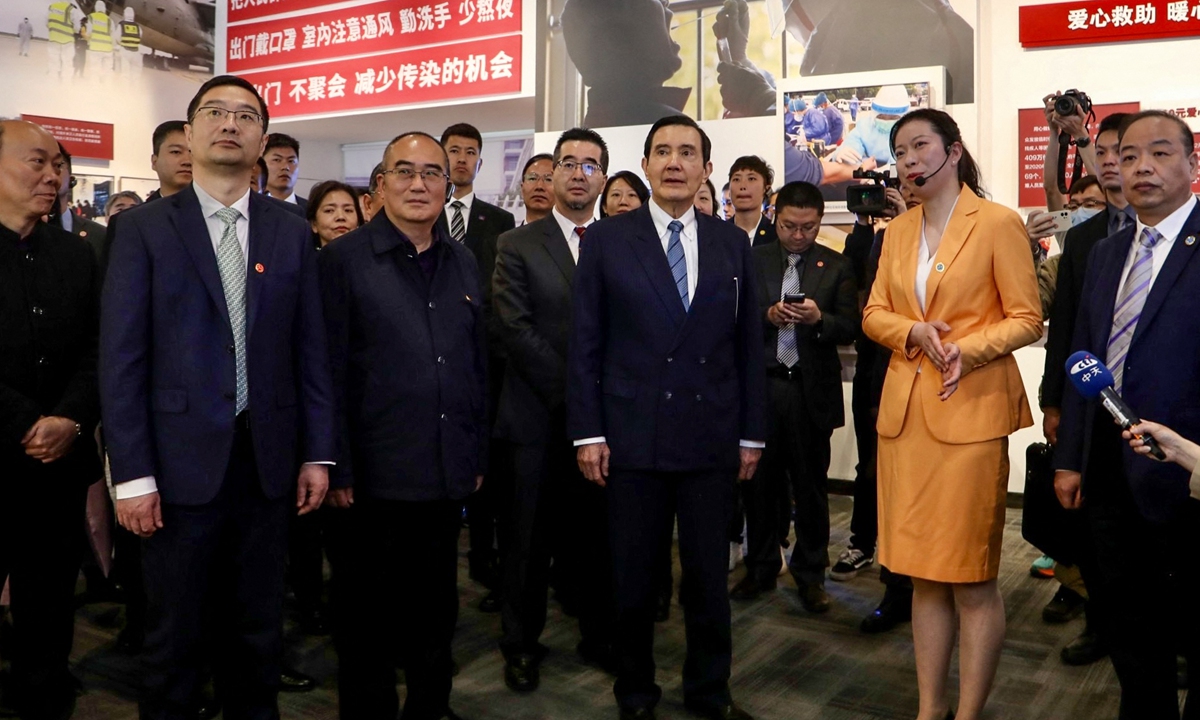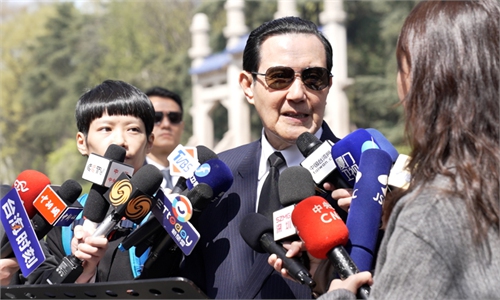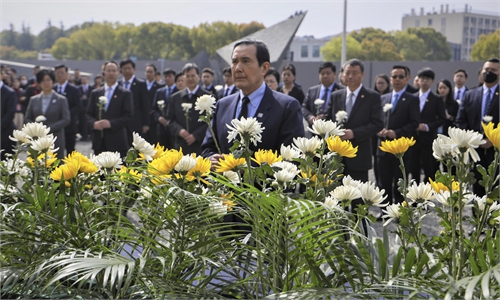Mainland's Taiwan affairs official meets visiting Ma Ying-jeou, highlighting 1992 Consensus as two sides of Straits are one family

During his long-awaited trip to the Chinese mainland, the former chairperson of the Chinese Kuomintang party Ma Ying-jeou visits an exhibition on Wuhan's battle against the COVID-19 epidemic on March 30, 2023 and pays tribute to medical workers for their sacrifice and dedication. Photo: VCG
The two sides of the Taiwan Straits are one family, said a senior mainland Taiwan affairs official during a meeting with the former chairperson of the Chinese Kuomintang (KMT) party Ma Ying-jeou, as the two stressed the importance of adhering to the 1992 Consensus on Thursday.
Song Tao, head of both the Taiwan Work Office of the Communist Party of China (CPC) Central Committee and the Taiwan Affairs Office of the State Council, met with Ma in Wuhan, Hubei Province as the latter's Chinese mainland visit continues in the Central China city. On February 9, Song met with the KMT's vice chairperson Andrew Hsia in Beijing.
Song conveyed the greetings of the General Secretary of the CPC Central Committee Xi Jinping to Ma, welcoming Ma and Taiwan compatriots to visit the mainland for exchanges, and affirming Ma's contribution to the peaceful development of cross-Straits relations.
"The two sides of the Taiwan Straits are one family," Song said, noting that peace, development, exchanges and cooperation are the common aspirations of people on both sides of the Straits.
He stressed that both the mainland and Taiwan should adhere to the 1992 Consensus, resolutely oppose separatist activities and external interference, and jointly safeguard peace and stability across the Straits and the overall interests of the Chinese nation.
The mainland will always care about, respect and bring benefits to compatriots in Taiwan. The mainland is ready to work with Taiwan compatriots to keep to the right direction of the development of cross-Straits relations, promote Chinese-style modernization and realize the great rejuvenation of the Chinese nation, Song said.
Echoing Song, Ma stressed that people on both sides of the Straits belong to the Chinese nation and share the same ancestors, and they should work together to promote sustainable peace and prosperity across the Straits, improve the well-being of Chinese people on both sides and jointly revitalize China on the basis of the 1992 Consensus.
According to Taiwan-based media, Ma told Song that it is regrettable that in the past few years, exchanges between the two sides have been suspended due to political turmoil and the epidemic. "We must talk, and we can only solve problems through talks."
Anything that is conducive to the welfare of people on both sides of the Straits should be done, Ma said, noting that the two sides must maintain exchanges, cooperate and do everything possible to avoid conflict.
Before meeting with Song, Ma started his fourth day in the Chinese mainland by visiting the Memorial Hall of the Wuchang Uprising in the Revolution of 1911 in Wuhan. The revolution, led by Chinese national hero and KMT founder Sun Yat-sen, ended more than 2,000 years of imperial rule in China.
While visiting an exhibition on the city's battle against the COVID-19 epidemic at the Wuhan Municipal Archives, Ma paid tribute to medical workers for their sacrifice and dedication. He said the city's effective COVID-19 control measures at an early stage had prevented a large-scale spread of the virus, which was a contribution not only to the mainland but also to the whole of humanity.
Ma, along with a delegation of Taiwan students, also talked to mainland students at Wuhan University during his visit, and 28 Taiwan students and 35 mainland students from the university gathered at the Wuhan University History Hall and shared their thoughts for about an hour.
He invited mainland students from Wuhan University to pay a visit to Taiwan this summer vacation, and the Ma Ying-jeou Foundation will arrange for them to live with Taiwan families for a long time, "so that young people from both sides of the Straits can get in touch with each other and understand each other more, so as to increase friendliness and gradually integrate together."
Huang Chih-hsien, an expert on cross-Straits relations and TV commentator from Taiwan, told the Global Times on Thursday that through Ma's mainland visit, Taiwan people are able to see, hear and feel things that they had not experienced before.
Ma's remarks touched upon deep-seated memories of Taiwan people's Chinese national identity, said Huang.
Wang Yu-ching, a Taiwan cross-Straits observer who lives in the Chinese mainland, told the Global Times on Thursday that Ma's mainland tour reflects the mainstream public opinion of peace, exchange and integrated development on the island of Taiwan.
It [Ma's visit] will bring back "homecoming fever," especially when the pandemic is about to finish, and many Taiwan people are looking forward to visiting the mainland, Wang said.
He noted that Ma's delegation is not the only one visiting the mainland currently. Many cross-Straits youth exchange groups have already started their mainland tours.
"In the second half of this year, there will likely be a surge of cross-Straits people-to-people exchanges, with more new arrivals who have not been to the mainland before.
"I hope Ma can bring Taiwan youth home often, and visit more mainland cities like Beijing, Xi'an and Shenyang, which would be beneficial to more harmonious cross-Straits relations, the common aspiration of both sides' Chinese people," Wang said.



